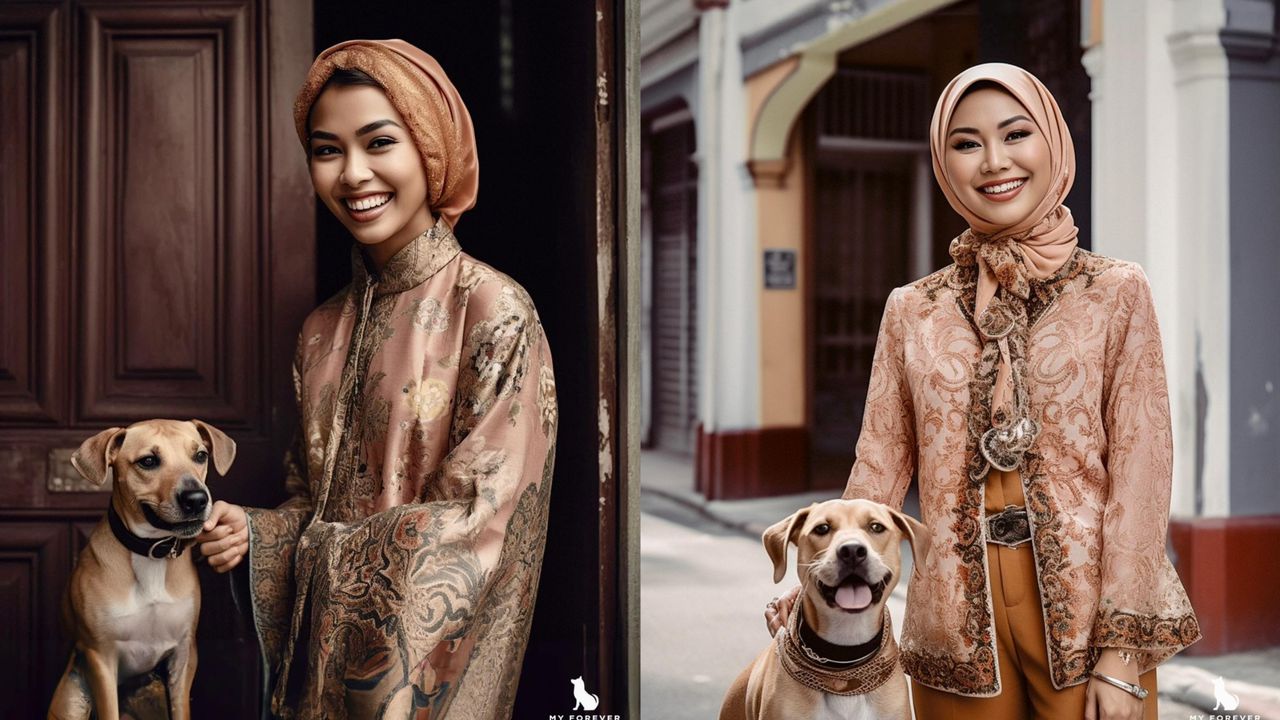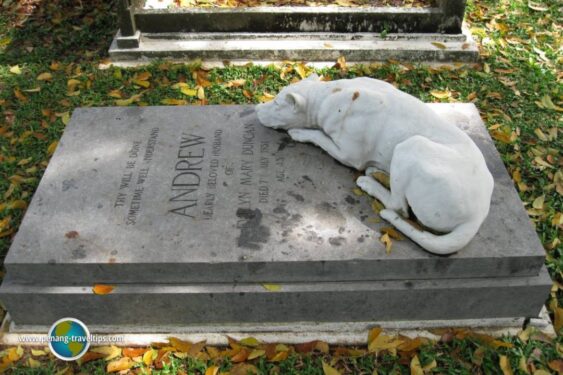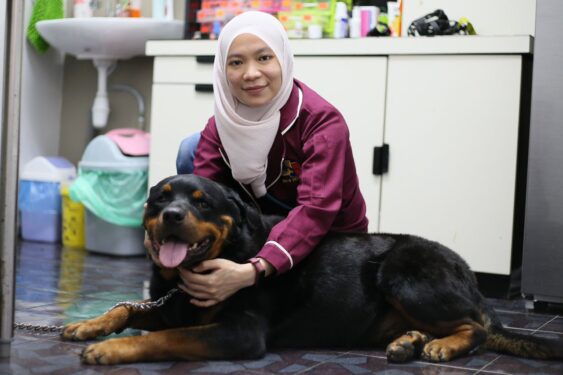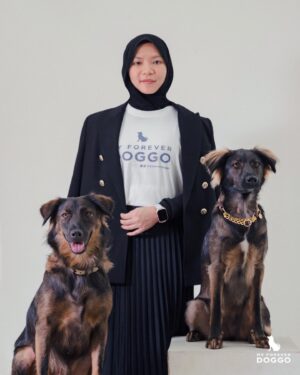
Muslim dog lovers have no qualms about keeping canines as pets

THEY say dogs are man’s best friend but not so among Muslims as Islam – as in Rabbinic Judaism – conventionally perceived canines as ritually impure.
This is despite the existence of a long history of positive interactions between Muslims and dogs that goes back to the religion’s very beginnings.
According to several authoritative accounts of his life and teachings, Prophet Muhammad himself prayed in the presence of dogs. Many of his cousins and companions – the world’s first Muslims – raised young puppies.
In the Mosque of the Prophet in Medina, the second holiest site in the world for Muslims after the Kaaba, dogs were regularly seen frolicking about during the prophet’s life and for centuries after as well.
Fast forward to modern day Malaysia, Muslims who keep dogs as pets are often faced with societal backlash as the animal is perceived to be “dirty, impure and sometimes even evil”.

“We used to have a dog as a pet but we were ostracised so much by our extended families that we had to give up our beautiful dog to someone else,” lamented Saiful Bahri Hasan Basri of Klang.
The 59-year-old company director gave up his dog “with a heavy heart” after they found a dog-loving family.
Indeed, Saiful’s story may not have to end that way. A Sunnah Sahih al-Bukhairi 3321 sighted by FocusM reads, “A prostitute was forgiven by Allah because passing by a panting dog near a well and seeing that the dog was about to die of thirst, she took off her shoe, and tying it with her head-cover, she drew out some water for it. So, Allah forgave her because of that.”
Clearly cruelty towards dogs is prohibited especially when dogs are men’s best friends. And best friends to women, too.
For Muslim veterinarian Dr Salehatul Khuzaimah Mohamad Ali who has been treating all kinds of animals – including dogs and pigs without prejudice – the stigma of touching dogs among Muslims is somehow quite unique in Malaysia compared to other countries for this could stem from few Islamic legal ‘traditions’ which have developed several injunctions against any contact with dogs.
 Dr
Dr Salehatul Khuzaimah Mohamad Ali a.k.a. Dr Ima with one of her many canine patients
“This, however, does not justify the abuse and neglect of dogs even though cruelty which contradicts the Quran’s views that animals are part of our communities,” rationalises the owner of Shah Alam-based Serv U Veterinary Clinic & Surgery.
“The belief and our local mentality of dog as haram (forbidden) is because most of us are conditioned to understand it that way. The Quran only stated that pigs are considered haram for human consumption, therefore, as Muslims we abstain from eating pork.”
Dogs, she added, are just categorised as najis mughallazah or impure. If a Muslim touched or handled these animals (more specific is the saliva of the dogs), the way to handle it is following the procedure known as sertu (Isamic ritual cleansing that focuses on the affected area/surface).

For Dr Kartini Farah Rahim, her father had several dogs she was a toddler. “They looked after our small orchard and to guard our house,” she said.
According to the medical doctor, being Muslim does not restrict her to keeping pet dogs. “Sertu is the principle of cleansing oneself according to the Mazhab Syafie which is very easy follow. Some clean soil, mixed with water thoroughly, is used to wash over the skin area once,” she explained. “Then, running water is used over the area six times.”
Dr Kartini is involved with a few non-government organisations (NGOs) to stop animal cruelty and seeking to create liveable communities where street animals and people can co-exist harmoniously through an effective and humane management of the strays. “I had had painful memories since small of how badly street dogs were treated,” she recalled.

Religious teacher Ustaz Muhammad Abdul Razak said there is no explicit law on keeping dogs in the Quran. “There are only the hadiths and the fatwas of Islamic scholars,” he revealed.
In the hadith, for example, Prophet Muhamad allowed the keeping of dogs for specific reasons such as looking after the crops, farm animals and for hunting purposes.
“For purposes other than stated in the hadith such as for search and rescue missions or to protect the owner from any potential harm, scholars have come out with a set of rules based on syarak principles which have to be kept,” the graduate from the Madinah Islamic University told FocusM.
Ustaz Muhammad who hails from Negri Sembilan cited the examples of classical fatwa such as the main religious fatwa of Mazhab Syafie which allowed dogs to be kept to protect homes and neighbourhood.
Meanwhile, the modern-day fatwa by the former grand mufti of Egypt, Dr Sheikh Ali Jumaah, allows dogs to be used for specific purposes that benefit the people. – May 4, 2023
Main pic credit: My Forever Doggo
“This, however, does not justify the abuse and neglect of dogs even though cruelty which contradicts the Quran’s views that animals are part of our communities,” rationalises the owner of Shah Alam-based Serv U Veterinary Clinic & Surgery.
“The belief and our local mentality of dog as haram (forbidden) is because most of us are conditioned to understand it that way. The Quran only stated that pigs are considered haram for human consumption, therefore, as Muslims we abstain from eating pork.”
Dogs, she added, are just categorised as najis mughallazah or impure. If a Muslim touched or handled these animals (more specific is the saliva of the dogs), the way to handle it is following the procedure known as sertu (Isamic ritual cleansing that focuses on the affected area/surface).

For Dr Kartini Farah Rahim, her father had several dogs she was a toddler. “They looked after our small orchard and to guard our house,” she said.
According to the medical doctor, being Muslim does not restrict her to keeping pet dogs. “Sertu is the principle of cleansing oneself according to the Mazhab Syafie which is very easy follow. Some clean soil, mixed with water thoroughly, is used to wash over the skin area once,” she explained. “Then, running water is used over the area six times.”
Dr Kartini is involved with a few non-government organisations (NGOs) to stop animal cruelty and seeking to create liveable communities where street animals and people can co-exist harmoniously through an effective and humane management of the strays. “I had had painful memories since small of how badly street dogs were treated,” she recalled.

Religious teacher Ustaz Muhammad Abdul Razak said there is no explicit law on keeping dogs in the Quran. “There are only the hadiths and the fatwas of Islamic scholars,” he revealed.
In the hadith, for example, Prophet Muhamad allowed the keeping of dogs for specific reasons such as looking after the crops, farm animals and for hunting purposes.
“For purposes other than stated in the hadith such as for search and rescue missions or to protect the owner from any potential harm, scholars have come out with a set of rules based on syarak principles which have to be kept,” the graduate from the Madinah Islamic University told FocusM.
Ustaz Muhammad who hails from Negri Sembilan cited the examples of classical fatwa such as the main religious fatwa of Mazhab Syafie which allowed dogs to be kept to protect homes and neighbourhood.
Meanwhile, the modern-day fatwa by the former grand mufti of Egypt, Dr Sheikh Ali Jumaah, allows dogs to be used for specific purposes that benefit the people. – May 4, 2023
Main pic credit: My Forever Doggo
They do not know what they are missing when they declare dogs as haram.
ReplyDeleteDogs have shown to be 100% faithful and will fight to the death in defending its master.